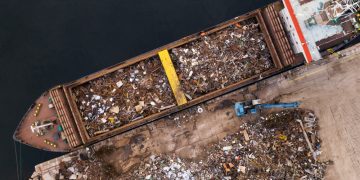Discussions on market-based measures will resume in October’s MEPC
 The International Maritime Organization (IMO) is making little headway on market-based measures to curb carbon dioxide emissions from international shipping, putting it on a policy collision course with the European Union, observers said.
The International Maritime Organization (IMO) is making little headway on market-based measures to curb carbon dioxide emissions from international shipping, putting it on a policy collision course with the European Union, observers said.
A committee of the 170-member United Nations shipping body was unable to make “tangible progress” after a week of talks that ended late on Friday, a delegate told Reuters.
An IMO spokeswoman said discussions on market-based measures, such as a levy on CO2 emissions and a cap-and-trade scheme, will resume in October when the Marine Environment Protection Committee meets again.
International shipping accounts for around 3 percent of the world’s emissions of the greenhouse gas that is widely blamed for global warming, and this share could go to 18 percent by 2050 if regulation is not in place, according to the IMO.
The European Union executive of the 27-nation European Union bloc has threatened to enforce its own shipping regulations if the IMO fails to act, as it has with aviation.
“While we have a clear preference for global action on measures to reduce emissions from shipping, we don’t see the IMO on track to deliver reductions consistent with the globally accepted maximum two degrees Celsius objective,” a Commission spokesman said, referring to a threshold many scientists say is needed to avert runaway climate change.
The Commission has recently started a public consultation on four policy options, including a compensation fund, an emissions trading system, a fuel or carbon tax and a mandatory emission reduction per ship. It runs through early April.
The consultation will be followed by an impact assessment and drafting of a Commission proposal between April and June, with a final proposal to be presented in the fourth quarter, said Commission spokesman Isaac Valero-Ladron.
IMO HITCH
IMO Secretary-General Koji Sekimizu has called for an impact assessment study on nine different market-based proposals and to finalize it by 2013.
“Let us work together and set ourselves the challenge of completing all of the work on the establishment of a market-based measure by a target year of 2015,” he said in his opening speech on Monday.
But the talks were bogged down by a debate about technical cooperation and technology transfer in relation to an agreement on an energy efficiency design index reached last year, delegates said.
Last July, forty eight countries voted in favor of adopting a mandatory energy efficiency design index (EEDI) for new ships and a voluntary energy efficiency management plant for all ships.
“There is bad feeling as a result of that,” said John Maggs, policy advisor at Seas At Risk, a European association of non-governmental environmental organizations.
“Those who didn’t support adoption of the EEDI last year are now causing difficulties for further progress on greenhouse gas measures.”
The talks were also held back by a debate about the appointment of a steering group to oversee the commissioning of the impact study, he said, adding “which as a result of developing country lobbying is now a necessary precursor to making any further progress.”
Source: Reuters




























































